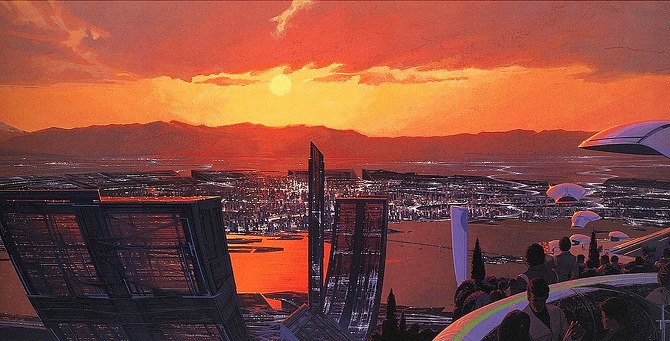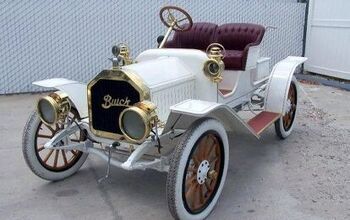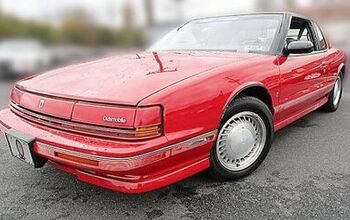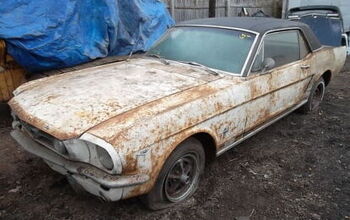Sunday Stories: "Night Racers" by Thomas Kreutzer
warning: the song in the video (“A Mistake” by Fiona Apple) contains strong language.
When I announced that fiction would be verboten on these pages, more than a few readers suggested that it might still have a place if it could be clearly marked and separated from the usual content. So here we go: “Sunday Stories” will be the place we put fiction. The usual TTAC loose restrictions on length and content will be further loosened for Sunday Stories, so read at your own peril. We’re welcoming submissions for this. If you readers don’t send me anything, you’ll be forced to see “fiction” about Tennessean hairdressers and Nevada strip clubs and whatnot, so get cracking! – JB
Kenny Huynh awoke alone in his room on the thirty fourth floor of the drab grey tenement. It had been a fitful sleep but it would be enough. He had a job to do. Only his great skill could ensure that the people he cared about had enough to eat. Fortunately he was the best. His skill would prevail.
The sun was just beginning to slip below the horizon as Kenny Huynh slipped out of his one room apartment on the thirty fourth floor of the drab grey tenement and made his way to the stairwell. Two of the building’s six elevators were in good working order, but Kenny avoided them because of the bright lights and security cameras. The door to the stairwell had once been alarmed, but a couple of jumper wires had solved that problem. Likewise, most of the once bright white LED bulbs that had lit the passage were now mysteriously out of operation and the few that still worked provided almost no direct illumination to shine on anyone who walked there.
It was a long walk down, but Kenny was in good shape and it took very little real effort. As usual, he met no one, and the only sound he heard was the barely audible shuffling of his own two feet as he made his way stealthily down. On the ground floor, two steel doors presented themselves, one leading to the outside and the other outfitted with a series of formidable looking locks. Kenny paused and listened to ensure that there was no tell-tale sound of footsteps from any angle of attack and pulled a set of ancient bronze colored keys from a pouch on his waist belt. With a few well practiced motions he worked all the locks with surprising speed, stepped through into the pitch darkness and, turning, immediately shut and relocked the door behind him.
Reaching out to his right Kenny found and activated the light switch and the cavernous room beneath the building was suddenly flooded with brilliant, white light. Here every LED worked and there were so many that he cast no shadow from any angle as he worked his way down three more flights of steps to the floor of the vast space. His feet firmly on cement, he made his way down a wide lane between rows of tall, clicking machines, turning at an inauspicious cross lane and then into an even more narrow alleyway that led to the corner of the room. Here, he found another door with a similar set of locks that he activated just as adeptly. He switched off the brilliant white lights and waited in the dark next to the door for a few minutes until his eyes had adjusted. Then, he stepped through and again locked the door behind him.
The tunnel was dimly lit and smelled musty. On either side of the arched passageway, huge cables ran in tightly packed bundles as big around as the branches of an ancient oak tree. As he walked stealthily along he paid little attention to the tunnel, which despite its size turned out to be a smaller side passage that joined still larger tunnels. At set intervals, the cables that ran along the wall flowed into junction boxes from which even greater bundles of cables emerged. All around him the dull hum of high voltage coursed through the air and he hurried his pace as he detected the sound of human activity ahead. Despite recognizing the occasional lilt of laughter or raised voice that echoed back down the tunnel as those of his closest friends, Kenny slowed as he approached the mouth of the tunnel and hung in the shadows. From his vantage point, he paused for a moment to assess the scene before deciding it was safe enough to join the men in a vast, underground chamber that lay spread out before him.
On the floor of the space, small groups of men worked on low slung, obviously incredibly fast machines. Most of them had six or eight wheels and the driver’s pod, an almost perfectly round sphere of bullet proof plexiglass, was set out ahead of the leading edge of the wheels. The bodies of the vehicles reminded Kenny of the alligators he had seen in the Mekong river when he was a child, wide a flat with bellies that curved outward to allow for more cargo, more batteries and more powerful capacitors. Range, speed and cargo capacity was what they were all about. His own machine, an eight wheeler with two sections joined by an accordion like joint sat on the far side of the room surrounded by his crew of nine men. Confident that nothing was amiss, he stepped into the light.
“Kenny!” shouted his friend Duc Thoc as the thin young man moved out of the shadows, “I was wondering when you would get here. It’s damn near dark out now!” Kenny nodded and waved. Duc always talked too much, Kenny thought. He laughed to much and tried too hard to be jovial, but Kenny knew that it was just how some men reacted to the pressure they were under and so he ignored it. He honestly liked the man.
Other men greeted Kenny with a silent wave or an even less obvious toss of their chins, but everyone he met took the time to stop their furious activity and give him some sort of greeting. That’s how it was when you were the best, Kenny knew, and all it took was one screw up to be usurped; not that it would matter to him personally, he thought grimly. A screw up would leave him a shattered body or a greasy stain on the highway, but at the very least it would be quick. It would mean more trouble for the people back home, starvation was an insidious thing, and so the thoughts of his own demise worried him in a rather odd, impersonal way.
Other crews still clambered over their drivers’ vehicles, but at this late hour Kenny’s crew waited for him silently in a small group, their hands in their pockets. Some drivers might have worried, but the men were professionals, Kenny knew, and the fact that they weren’t rushing about making final preparations in the minutes before departure told him that his vehicle was well prepared. The crew chief gave a nod and the group quietly dispersed as Kenny approached. “She‘s a hundred percent.” The man said simply.
Kenny nodded. His success, he knew, was the result of his crew’s hard work. They knew their craft and his vehicle had always been well sorted. He looked at the vehicle briefly and then nodded to the crew chief, “Looks good,” He said, “I’ll try to bring her back in one piece.”
The crew chief smiled. “You always have.” he answered.
The two men shook hands and Kenny headed for the cockpit. The hatch on the bottom of the sphere was small, but Kenny grabbed the upper edge and swung his body into position legs first as the crew chief closed and locked the door behind him. Despite the amount of equipment in it, the sphere was fairly roomy and Kenny slipped over into his acceleration chair with little trouble. He buckled himself into his five point harness, pulled the steering wheel from its storage space and locked it onto the steering shaft. He checked a row of dials on the instrument panel and flipped a pair of switches that brought the power systems fully online.
Around the great chamber other drivers were in various states of readiness, buckling into their vehicles and making final checks. Kenny reflected for a moment on the situation. Out there in the darkness Western society was sinking further into decay, but its automated farms and factories still worked tirelessly to support its citizens. It didn’t matter that most of the people who had once lived in those great glittering cities that still shined like beacons had forgone their bodies for the virtual worlds they now occupied. In the real world the machines lived to serve the citizenry no matter what their condition and as long as there was some semblance of humanity remaining, the machines would continue to work.
Not all of the world had the resources to escape reality, however, and as the entire populations of the wealthier nations of Earth vanished into cyberspace, the people of the poorer countries still suffered on their less advantageous side of the digital divide. The West’s decline should have meant more materials and more arable land for the people left behind, but the robotic systems that the West had put in place still maintained a vast physical infrastructure that no one would use, still consumed resources at a prodigious rate to no end, still manufactured consumer goods for which there were now no buyers and still planted, harvested and stored food that would spoil in warehouses without being eaten. But for the fact that the West’s robots still built sophisticated weaponry, the rest of the world would have moved in and pulled the plug on them long ago.
But an outright attack would have merited a military response and the almost certain destruction of any enemy combatants, but illegal immigration, thievery and smuggling were civil matters in the West. The West had always tolerated some amount of illegal movement and so long as a person didn’t do anything to make themselves too noticeable they could survive unnoticed in the cities despite the fact the that there were almost no actual citizens on the streets anymore. For whatever the reason, so long as a person didn’t draw attention to themselves by committing a crime, the robotic police simply didn’t see them.
So, it had started out simply at first. Small groups of hungry people had snuck into the West where they occupied empty housing units and foraged for food. When they could, they sent word to those they had left behind and others followed. When there was a critical mass, they organized themselves and their living conditions improved. From there is was just a series of small steps into outright organized crime, the occupation of entire warehouses, looting their contents and smuggling them oput of the west to the people suffering elsewhere.
Getting the cargo out was the job of the Night Racers. Men like Kenny and Duc Thoc who risked their lives in high powered vehicles that were a cross between a formula race car and an 18 wheeled semi truck. Packed right, the vehicles could hold 15 metric tons of cargo without any significant impact on their acceleration and handling, but the real trick of getting the contraband through lay with the men who sat behind their wheels. They were a tough wiry breed, usually small and light with tremendous hand eye coordination and superior reflexes. The lives of their countrymen depended upon their success and they were, to a man, devoted to their craft.
On the far side of the great chamber one of the vehicles lurched forward and turned onto the duck walk that led to the big gate. As it moved every crewman on the floor took it as a signal to finish their work and move to the side tunnels around the space. As the last man reached safety, the lights in the chamber were cut and total darkness reigned supreme.
Kenny let the blackness close in around him and work on his eyes for a few moments before activating the night vision display in his cockpit. He found that a few moments of darkness heightened his senses and, when he finally touched the panel, the world around him glowed in a brilliant green hue that might otherwise have been more muted.
At the edge of the chamber the massive door slipped silently open and the first vehicle shot out into the night. Then, one by one the other vehicles moved towards the door. The fifth one to go was Duc Thoc and Kenny saw him flip him a mock Top Gun salute as his machine rolled by. Kenny resisted the urge to join his friend and allowed four more Night Racers to roll silently by and out the great door before he finally swung his own machine into the line.
One by one the cars were moving out, some accelerating quickly away while others moved to builf up their speed more slowly in an attempt to try and preserve their batteries. Outside the door the great city rose up on all sides and miles of silky smooth pavement whirled around the tall buildings on ribbons of elevated expressways. The city lights caused the night vision in Kenny’s cockpit to momentarily flicker before it adjusted to counter their glare but he had been expecting the effect and blinked it away with little trouble. The other Racers were already out there drawing police patrols away, Kenny knew, and now it was his turn to join in the great game. He smiled grimly and worked the throttles.
The world rushed forward as the big vehicle quickly gained speed. Kenny took a quick glance at his power gauges and made sure there were no anomalies before pressing on. At the first intersection he jinked hard right, went up several blocks and then swung left again. He shot past the entrance ramp to an underground expressway and a few blocks later past another that led to one of the elevated roads that soared so high overhead. Each driver had their own method, he knew, some liked to go underground where the aerial units couldn’t reach them but the tunnels always seemed risky to Kenny. The high roads overhead might be faster, too, he thought, and many men used them, but the chance of a mistake sending you over the edge was too great in Kenny’s mind and he avoided them as well by sticking to the broad central boulevards of the city as long as possible.
Ahead the road split into a thoroughfare eight lanes wide that ran straight from the heart of the city to the ring road that ran around the edge of the great metropolitan area. It might be patrolled, he knew, but it was worth the risk. He hammered the throttle and threw the switch to the first capacitor, sending an overboost of electricity to the powerful wheel motors of his vehicle and causing it to surge forward in an instant. The vehicle accelerated hard into the triple digits and Kenny held hard on the throttles as he blew through intersection after intersection, his passage activating dozens of red light cameras and alerting police to his activities.
The police, though, had their hands full. Almost a score of Night Racers were blasting around the city causing alarms and creating mayhem. The computer responded as best it could by activating new units but the city also seemed to be suffering from a sudden crime spree that was causing several life and death emergencies to be added to the response roles every minute. The computerized response system cared little for the fact that there had been no crime in the city for more than a decade, this current outbreak demanded immediate response and as the subroutines kicked in to triage the situation, calls of citizens in danger trumped simple traffic offenses. The cars were sent away from the center of town and Kenny moved on through the city at high speed, his progress unimpeded.
The great ring road swept around the city limits and Kenny was traveling full tilt when he hit the onramp. By this time more than a dozen other Racers were on the loop heading for one of the highways that would head towards the Southeastern Frontier. Kenny found an interchange that led to a road heading in the right direction and guided the big vehicle up over a towering overpass without easing up on the throttles. From here, he knew, the road was long, straight and silky smooth for almost its entire 500 kilometer length to the border. That did not mean, however, that he could let his guard down.
He ran along in silence for almost ten minutes, his gauges in the green and his pursuit radar indicating he was alone when ahead there was a flash of lightning, the bright white of electrical discharge shooting skyward, followed by a clap of thunder. It was bad, he knew and adrenaline surged into his system, putting his senses on high alert. He was on the scene less than a minute later. Still traveling full speed and had only a moment to look, just enough time to dodge the carcass of another Night Racer’s broken vehicles as it laid sprawled across two lanes of the expressway, much of its cargo afire and strewn about the fields beside the roadway for almost a full kilometer around.
Despite the speed at which he passed, Kenny read the situation with a practiced eye. There could be no survivor, he knew, batteries blew up with such traumatic force that bodies were often often atomized. Given the straightness of the thoroughfare and the relative ease at which even the most novice of drivers should have been able to handle the situation, Kenny felt troubled. It was just too damn strange. Without further thought he flipped the switch and fired his second capacitor, the sudden surge of speed instantly helping to put distance between himself and the mystery behind him.
The sudden explosion behind Kenny’s vehicle caught him by surprise. His pursuit radar went red and missile alarms blared a belated warning a moment too late. Whoever was on him was damn close. Kenny stayed hard on the throttle as the capacitor fully discharged driving his velocity close to 600 KPH as he worked the wheel to avoid letting his opponent get a target lock. Behind him a series of explosions tore up the roadbed, each shot perfectly aimed to strike the spot where his vehicle would have been but thrown off just enough by his unexpected evasive maneuvers to make the missiles miss. Kenny flipped a series of switches and sent forth a counter barrage of chaff and electronic noise in an attempt to confuse whatever it was that had locked onto him, but still the missiles fell with an ever increasing accuracy. He also pressed a paddle behind his wheel and did something he had never done before as a driver: sent a transmission. “Kenny here.” He said simply, “Car down on highway 38. Road likely impassable. I am under attack.”
Elsewhere other drivers would intercept the message and know to vary their routes accordingly. They would not reply, he knew, to do so was to pass along too much information so when the radio crackled a response, the effect was chilling. “Come in Kenny,” Said a voice, “Have you sighted. Stand down.”
Kenny could not stand down and toyed briefly with the idea of firing his third and final capacitor to escape. The throttle was to the firewall and his vehicle was humming with electricity as the batteries worked to power the eight mighty motors with every electron they could generate. He could, he knew, dump his cargo by breaking his link to the back half of his vehicle in order to escape, but while turning salamander might allow him his freedom, it would not fill the empty bellies of his countrymen. Also, this new threat needed to be countered, it had already killed on Night Racer, possibly even his friend Duc. The unexpected though angered him as the very real possibility of his friend’s demise hit home. “No dice.” He radioed back.
In a frenzy Kenny jinked right, barely upsetting the suspension on the big machine and slammed on the brakes. Ahead and to the left the night lit up with another missile attack and a heavily armed military aerial drone shot past low overhead. Kenny had no time to think about the implications of the military markings as the drone dipped momentarily to just one meter above the roadway as its rotors lost lift due to the heat of the explosion. Seeing his opportunity, Kenny fired the final capacitor and the extra burst of energy drove the big machine instantly forward. The exposed sphere of the cockpit mounted on the front of the mighty wheeled machine slammed hard into the armored underside of the drone and its plexiglass windshield split wide open. A torrent of high speed wind poured into the cockpit blinding Kenny and, instinctively, he threw his arms over his face and lost control.
The aerial drone bounced hard of the plexiglass sphere, lifted skyward for a moment and then fell like a stone to the left as Kenny’s big machine roared past, its ordinance sending up a giant fireball. The shockwave wrapped around Kenny’s vehicle, lifting and twisting it, breaking the connection between the front and rear halves and spilling boxes of frozen dinners out onto the highway. The front half of the machine landed hard, both front wheels snapping off and spinning away into the night while the back half of the machine flipped end over end and cartwheeled another 500 meters up the roadway before erupting in a bright orange ball of fire.
Kenny lay pinned against his seatback as the front half of the machine made a series of flat spins and the pavement ground away its velocity in a million shards of molten metal. Totally beyond control, it spun into the cement ditch beside the roadway and in a final, awful tearing of plastic and steel, the cockpit sphere itself broke loose from the front of the vehicle and rolled another dozen meters onto the flat plain beside the roadway before finally coming to a rest in a motionless, smoldering heap.
In the broken cockpit, the shattered remains of Kenny Huynh remained belted behind the controls of his vehicle. He stared out from his seat onto the starlit plane, the flickering flames of his own burning machine reflecting in his black pupils. He felt his life slipping away and, oddly, it wasn’t as bad as he thought it would be; he felt no pain, only disappointment. He sighed heavily and his life fled from his body with his final breath. It was over. There was a moment of peace and then world flickered, jumped and went black as the program erased the night’s events and began again.
Thomas Kreutzer currently lives in Buffalo, New York with his wife and three children but has spent most of his adult life overseas. He has lived in Japan for 9 years, Jamaica for 2 and spent almost 5 years as a US Merchant Mariner serving primarily in the Pacific. A long time auto and motorcycle enthusiast he has pursued his hobbies whenever possible. He also enjoys writing and public speaking where, according to his wife, his favorite subject is himself.
More by Thomas Kreutzer
Latest Car Reviews
Read moreLatest Product Reviews
Read moreRecent Comments
- Ajla Maybe drag radials? 🤔
- FreedMike Apparently this car, which doesn't comply to U.S. regs, is in Nogales, Mexico. What could possibly go wrong with this transaction?
- El scotto Under NAFTA II or the USMCA basically the US and Canada do all the designing, planning, and high tech work and high skilled work. Mexico does all the medium-skilled work.Your favorite vehicle that has an Assembled in Mexico label may actually cross the border several times. High tech stuff is installed in the US, medium tech stuff gets done in Mexico, then the vehicle goes back across the border for more high tech stuff the back to Mexico for some nuts n bolts stuff.All of the vehicle manufacturers pass parts and vehicles between factories and countries. It's thought out, it's planned, it's coordinated and they all do it.Northern Mexico consists of a few big towns controlled by a few families. Those families already have deals with Texan and American companies that can truck their products back and forth over the border. The Chinese are the last to show up at the party. They're getting the worst land, the worst factories, and the worst employees. All the good stuff and people have been taken care of in the above paragraph.Lastly, the Chinese will have to make their parts in Mexico or the US or Canada. If not, they have to pay tariffs. High tariffs. It's all for one and one for all under the USMCA.Now evil El Scotto is thinking of the fusion of Chinese and Mexican cuisine and some darn good beer.
- FreedMike I care SO deeply!
- ClayT Listing is still up.Price has been updated too.1983 VW Rabbit pickup for sale Updated ad For Sale Message Seller [url=https://www.vwvortex.com/members/633147/] [/url] jellowsubmarine 0.00 star(s) (0.0) 0 reviews [h2]$19,000 USD Check price[/h2][list][*] [url=https://www.ebay.com/sch/i.html?_nkw=1983 VW Rabbit pickup for sale Updated ad] eBay [/url][/*][/list] Ceres, California Apr 4, 2024 (Edited Apr 7, 2024)




































Comments
Join the conversation
Fiction is sometimes stranger than truth. Your story reminds me of just why we got our butts handed to us in Nam. The big infrastructure you describe in the opening paragraphs may seem impersonal, but it absolutely has to have its humble custodians. Some were NVA agents. All else followed.
I liked it. I love dystopian scifi, and this painted a vivid image of a future that still (luckily) seems too far. There where a few gramar mistakes here and there (english is not my first language so who am I to point mistakes)but that's easy to improve. I at least really appreciate fiction in this website. Jack's stories are witty and fun, a sort of automotive Bukowski, and Thomas' show promise. Keep up the good work!